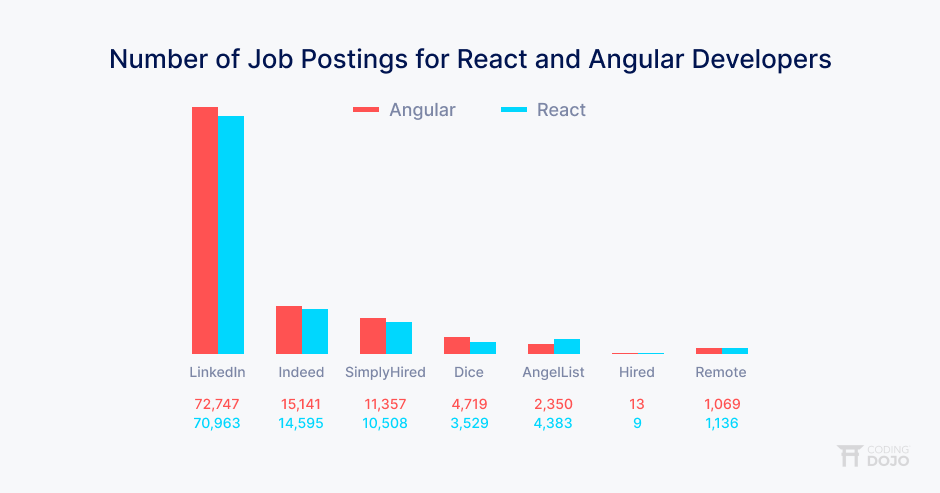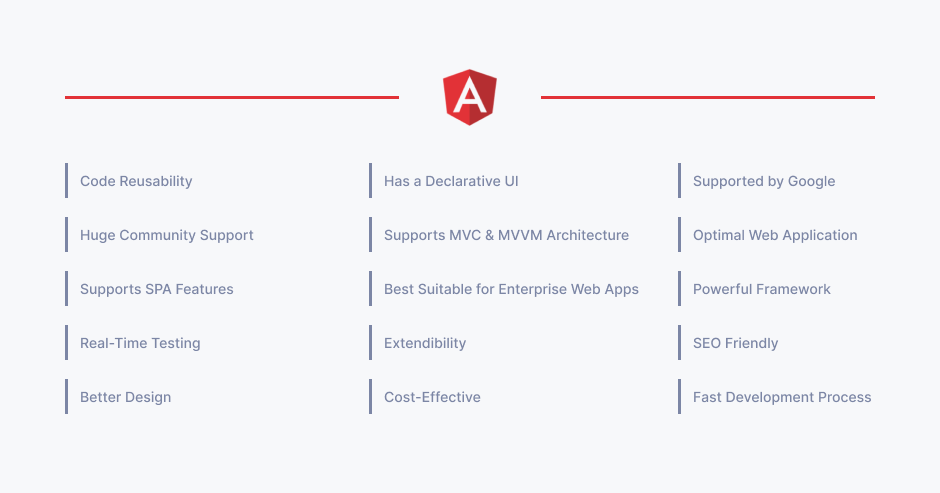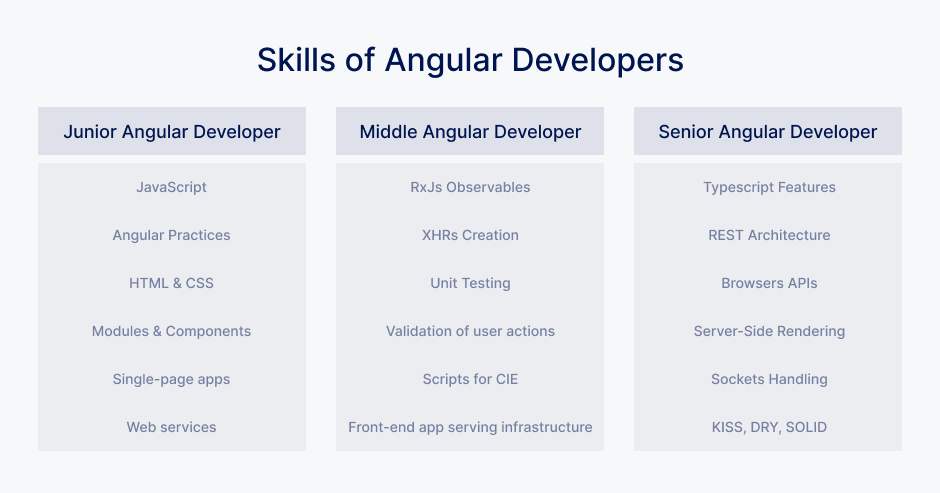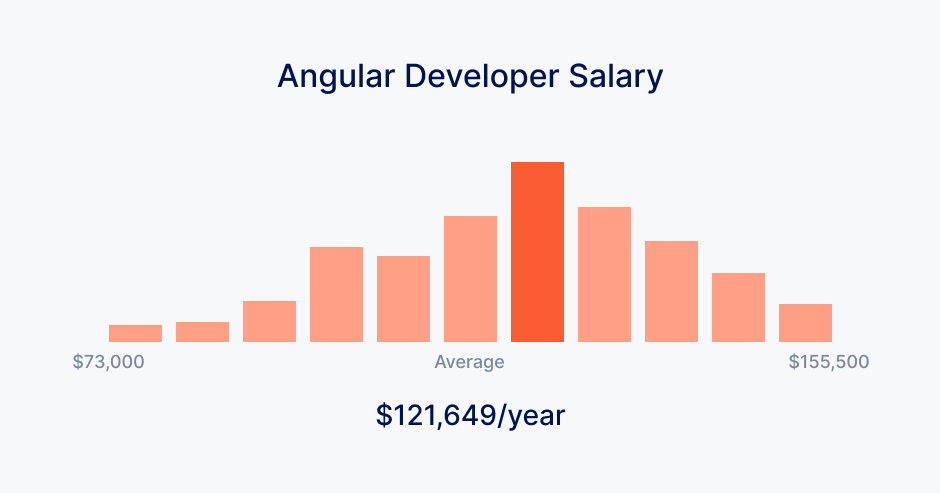Angular stands out as a premier front-end web development framework, empowering developers to create high-performance mobile and desktop web applications. Developed by Google, this TypeScript-based open-source framework is a staple for millions of developers, securing its spot as the second most used front-end framework with over three million weekly npm downloads. Notable websites like YouTube, Upwork, PayPal, and Cloudflare rely on Angular for their functionality.

Yet, with the market teeming with developers, hiring Angular talent can be a daunting task. This guide lays out the intricacies of hiring Angular developers, offering insights into their crucial skills, knowledge, and the key factors to consider, including salary expectations. Let's delve into the fundamentals of what defines an Angular developer and what it takes to make the right hire.
Let’s go over the basics.
Check out how Index.dev helped SimpliField, mobile platform for retail operations, hired JavaScript developers to facilitate tech stack migration from outdated Angular.js to modern Angular →
What is Angular?
Angular is a robust and widely adopted framework for constructing web applications, released by Google. Its primary purpose is to streamline the development and testing of web apps, offering a framework for client-side Model-View-Controller (MVC) and Model-View-ViewModel (MVVM) architectures. The core of Angular relies on TypeScript, HTML, and CSS, with TypeScript enhancing code quality and maintainability through static typing and object-oriented programming.
Designed for web apps and single-page applications (SPAs), Angular excels in providing a structured and modular framework. Key features like two-way data binding, dependency injection, and directives contribute to creating highly interactive user interfaces with clean, maintainable code.
Angular is also integral to the MEAN stack, a technology assembly for full-stack web applications, alongside MongoDB, Express, and Node.js.
- M – MongoDB, NoSQL (non-relational) database
- E – Express, back-end middleware
- A – Angular, front-end framework
- N – Node.js, runtime environment.
The MEAN stack simplifies development with its uniform use of JavaScript across both client and server sides. MongoDB, a NoSQL database, stores data flexibly in a JSON-like format. Express.js acts as back-end middleware, facilitating the creation of responsive web applications and APIs. Angular framework enables dynamic, single-page applications on the client side. Node.js serves as the runtime environment. This cohesive stack is a popular choice for building scalable, high-performance web applications in a unified JavaScript environment, minimizing context switching and optimizing the software development workflow.
Hire senior, high-performing Angular developers with Index.dev in just 48 hours →

Angular Tools and Setup
Angular developers employ a set of robust tools to unlock the full potential of the framework, ensuring efficient development and optimal application performance. Here are three key tools crucial for Angular developers:
1. RxJS (Reactive Extensions for JavaScript):
- A library for reactive programming with observable streams.
- Facilitates efficient handling of asynchronous data and events.
- Enables Angular developers to manage complex data flows and event handling with concise code and straightforward error handling.
2. Angular CLI (Command-Line Interface):
- Simplifies project initialization, development, and deployment.
- Automates repetitive tasks, enforces best practices, and provides a consistent development environment.
- Enhances productivity and ensures a standardized workflow for Angular developers.
3. IDEs (Integrated Development Environments):
- Tools like Visual Studio Code and WebStorm.
- Offers intelligent code completion, robust error detection, and a variety of extensions tailored for Angular development.
- Improves code quality and accelerates the development process.
What Does an Angular Developer Do?
An Angular developer is a specialized software professional dedicated to crafting and implementing user interfaces through the Angular framework. Their central role revolves around constructing dynamic, efficient, and high-performing web applications, primarily focusing on the client side. Key responsibilities include designing the application's structure, developing modules and components, ensuring seamless data binding, and facilitating interaction with the backend.
In addition to full-stack developers specializing in the Angular tech stack, they engage in testing, debugging, and optimizing applications for enhanced performance and scalability. Collaboration with other team members, such as backend developers and web designers, is crucial for a streamlined development process.
Key responsibilities of an Angular developer:
- Building scalable and interactive web applications with ease of updates.
- Implementing international coding standards to deliver high-quality software.
- HTML, CSS, and JavaScript coding skills.
- Providing a RESTful API to cater to diverse customer data representation needs.
- Utilizing APIs and external data sources to enrich application functionality.
- Fixing bugs and conducting unit tests for ongoing projects.
- Collaborating with backend developers to create UI/UX architectures.
- Continuously updating applications in alignment with emerging technologies.
Also read: How to hire Front-End developers effectively
Key Skills to Look Out for in Angular Developers
Because Angular is a comprehensive framework, finding a good Angular developer might seem daunting. Following are some essential skills a good candidate should have:
Tech Skills
1. JavaScript ES6
JavaScript ES6 introduces key features like arrow functions, classes, template literals, and more. These enhancements are widely supported, making ES6 the standard for modern web development. A must-know for Angular developers.
2. Angular Core Concepts
A solid grasp of directives, templates, and dependency injection is crucial for Angular developers. These concepts form the foundation of the Angular framework.
Angular templates, written in HTML with Angular-specific syntax, utilize directives to modify the DOM, rendering dynamic content on the UI. Directives like `ngIf`, `ngFor`, `ngClass`, and `ngStyle` add behavior to elements.
Dependency injection, a key design pattern in Angular, decouples apps by creating service and module dependencies where needed, maintaining module independence. Understanding these principles is essential for any Angular developer.
3. Proficiency in TypeScript
Angular developers must be well-versed in TypeScript, a strongly typed superset of JavaScript. TypeScript enhances web app development by offering additional features that lead to faster development with fewer errors.
The ideal candidate should be familiar with TypeScript features, such as interfaces, type checking, namespaces, and modules. Additionally, an Angular developer needs to understand the TypeScript compiler and its application in converting TypeScript files to JavaScript.
Also read: TypeScript developer hiring guide
4. Reactive Programming and API Integration
Angular developers should possess a solid understanding of reactive programming, particularly with the RxJS library. Reactive programming employs asynchronous and non-blocking concepts to propagate real-time data updates through a system.
Furthermore, an Angular developer's proficiency in API integration is crucial. As frontend developers, they often need to integrate with backend APIs. This necessitates familiarity with REST, including standard methods like GET, POST, PUT, UPDATE, and DELETE. Knowledge of alternatives such as SOAP and GraphQL is also advantageous.
5. Responsive Designs
A great Angular developer excels in responsive design, ensuring that websites are visually appealing and functional across various screen sizes, including mobile, tablet, and desktop.
6. Versioning Tools
Angular developers must be adept at using versioning tools, essential for managing and tracking changes in code over time. Proficiency in tools like Git, Apache Subversion (SVN), and Mercurial SCM is crucial for collaborative and iterative programming. Ideally, familiarity with repository management tools such as GitLab, GitHub, and BitBucket for remote code management adds to their skill set.
Also read: JavaScript developer hiring guide
Soft Skills and Remote Work Proficiency
1. Team Collaboration
Soft skills are crucial for Angular developers, emphasizing efficient team collaboration. Candidates should demonstrate the ability to work seamlessly within a team environment.
2. Clear Communication
Angular developers must communicate clearly with stakeholders, back-end engineers, and fellow front-end team members to ensure a smooth workflow. Developers must stay in sync with the team and have a clear understanding of project goals, emphasizing effective remote communication.
3. Adaptability
Adaptability is essential in this dynamic role. Candidates should showcase flexibility and openness to change, providing creative solutions to complex issues that may arise during development.
4. Independence and Initiative
Ideal remote Angular developers should exhibit the capability to work independently and take initiative. These traits contribute to maintaining focus and productivity in a remote setting.
5. Time Zone Compatibility
Consider time zone compatibility to facilitate smooth collaboration. Ensuring alignment in working hours prevents potential delays and enhances the overall efficiency of remote teams.
Also read: 7 traits to look for when hiring top-level remote developers, excluding the hard-skills
Sourcing Remote Angular Developers
When it comes to sourcing a high-performing Angular developer, there are several avenues you can explore:
1. Index.dev's Global Talent Pool
Optimize your hiring process by utilizing Index.dev's global talent pool. Index.dev offers a unique solution with a curated network of experienced software engineers specializing in Angular development. Streamline your hiring journey with Index.dev's comprehensive services, including talent matching, team management, payroll, and ongoing support. Build and oversee a successful remote team of Angular developers effortlessly.
2. Online Platforms and Job Boards
Begin your search by leveraging online platforms and job boards tailored for the tech industry. These platforms offer a convenient way to post job listings, review candidate profiles, and connect with skilled Angular developers. Choose platforms aligned with your project's specific tech needs.
3. Partnership with Remote Software Development Agencies
Consider partnering with remote software development agencies to access an extensive talent pool. These agencies boast networks of proficient Angular developers and provide support throughout the hiring process. Benefit from their expertise in administrative tasks such as payroll and compliance for a smoother team-building experience.
4. Freelance Marketplaces
Consider reputable freelance marketplaces like Fiverr and Upwork if you need to hire freelance Angular developers for specific projects. These platforms offer a range of talented professionals. Additionally, explore alternatives to Toptal to ensure you find the best fit for your requirements.
5. Online Communities
Engage with communities such as Reddit, Stack Overflow, and GitHub. These platforms provide opportunities to connect with Angular talent, learn from their expertise, and identify potential candidates.
Also read: 15 less-known benefits of hiring contractors globally with Index.dev
Screening Remote Angular Developers
When screening Angular developers remotely, tech recruiters often play a crucial role in assessing candidates. Here are some helpful tips for conducting effective screening:
1. Decide: Junior vs. Senior Developers
Define the level of expertise needed based on project requirements. Junior Angular developers should have foundational skills, while mid and senior-level developers need advanced capabilities. Assess skills such as Angular module knowledge, reusable component development, and proficiency in JavaScript and HTML5 for juniors, while looking for skills like RxJs Observables, API understanding, and TypeScript features for seniors.

2. Evaluate Work Experience Through Personal Interviews
Conduct personal interviews to evaluate a candidate's cultural fit, soft skills, and teamwork. Use questions that reveal their approach to conflict resolution, creativity, adaptability to role changes, teamwork preferences, and handling underperforming team members. Dive deeper with follow-up questions to gain insights into candidates' thought processes:
- How do you handle disagreements with team members?
- Share an example of applying a creative coding strategy.
- Describe handling a significant role change.
- Team or individual work preference? Why?
- Approach to addressing team member underperformance?
3. Explore Angular Fundamentals in Technical Interviews
A technical interview is crucial for assessing candidates' hard skills. Explore their knowledge of essential Angular features, data binding examples, the benefits of using Angular, Angular components, and the purpose of directives. Encourage candidates to provide examples and test their practical application of knowledge. Dive into their programming knowledge with targeted questions:
- What are the key Angular features?
- Provide examples of data binding in Angular.
- Explain the benefits of using Angular.
- Outline the components in Angular.
- Describe the purpose of Angular directives.
4. Pay Attention to the Candidate's Environment
Guide candidates to participate in interviews from a conducive environment—well-lit, clutter-free, with good camera quality and a headset for clear audio. A professional setting enhances the overall interview experience and ensures effective communication.
5. Check References and Previous Work
Validate candidates' experience and capabilities by checking references and reviewing previous work. This step ensures that the selected Angular developers are not only skilled but also reliable contributors to your project's success.
Hire remote-ready vetted Angular developers with Index.dev in just 48 hours →
Angular Developer Salaries
Hiring Angular developers can be tough. Pay matters. On average, Angular developers earn around $121,649 a year. But, pay can range. Some top roles hit $155,500 yearly.

Angular is popular but might not be the highest-paid. To steer clear of costly mis-hires, consider the average cost of $61 - $90 per hour. To offer a good salary, do market research. Check the developer's experience, skills, location, and your project needs to stay competitive. Precision in your initial hire is crucial.
Also read: 6 strategies for seamless integration of remote developers into your tech team
How Index.dev Can Help
Getting the right remote Angular developers is crucial. It requires a thorough vetting and assessment process. Index.dev makes it easier with a 4-step vetting process:
1. Extensive Sourcing
Index.dev goes beyond typical tech talent databases and leverages over 500 channels to find candidates. Each candidate is evaluated individually to select high-performing tech talent.
2. Thorough Tech Assessment
The platform goes beyond resumes and cover letters, delving deep into each candidate's abilities through extensive interviews and technical evaluations. Candidates who excel in one or two key tech skills and have industry-specific expertise are prioritized.
3. Meticulous Soft Skill Verification
Candidates screened by Index.dev possess soft skills like problem-solving, communication skills, creative thinking, focus on analysis, time management, emotional intelligence, self-learning, or attention to detail.
4. Laser-Focused Matching
Index.dev handpicks talent based on tech skills, soft skills, and specific company needs, using both technology and tech recruiters for the best fit.
Also read: Vetting high-performing tech talent at Index.dev
Next Steps
To build a successful tech company, it's crucial to make the right decisions, from identifying the target market to developing a minimum viable product and iterating based on user feedback. However, one of the most critical factors in determining your project's success is having a team of skilled developers in place. That's why it's essential to have a plan that ensures you can acquire and retain top talent in a scalable and cost-effective way.
To streamline the hiring process and find the perfect Angular developers for your team, leveraging cutting-edge tech talent pool and technology is key. At Index.dev we specialize in connecting you with highly skilled Angular developers, eliminating the tedious tasks of searching, screening, and interviewing candidates.
By partnering with Index.dev, you can hire your star Angular developer up to 7 times faster and with greater efficiency than ever before. We not only save you valuable time but also help you optimize your hiring budget by reducing costs by at least 50%.
Let Index.dev be your trusted partner in building a strong and talented development team that will drive the success of your tech company.
If you're a skilled Angular developer seeking high-paying remote jobs, joining Index.dev can connect you with promising projects in the US, UK, and EU markets.